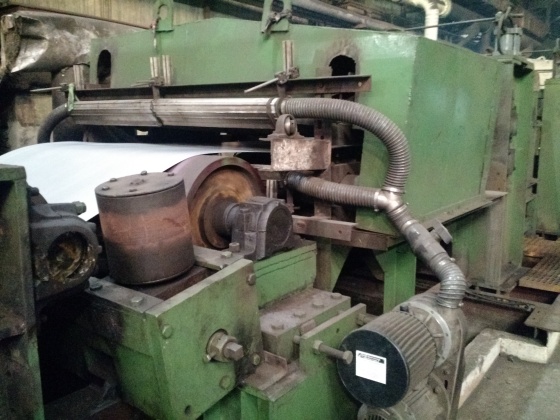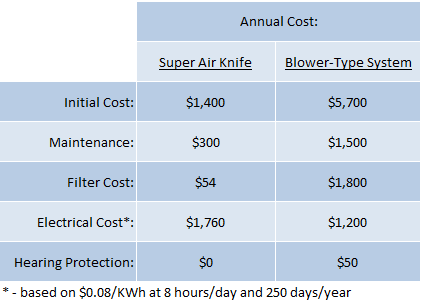
A sheet metal company made thin stainless steel sheets in
their process. Before the sheets were rolled up, it went through
a washing system. Two blower-type air knives were mounted after the
wash cycle to remove the residual water from the surface. They
purchased the blower-style air knives under the belief that they would save
money by not using compressed air. They found out quickly that it was
not a true statement especially when it comes to the total cost of ownership.
With the dirty environment at their facility, the inlet filter
on the blower was getting plugged. The blower motor would heat up from
the filter being restricted. After eight months of service, the blower
motor failed due to excessive heat. The replacement was very costly,
and it created a production stoppage for an entire day. The
manufacturer of the blower-type air knife recommended that the filter should be
changed every month instead of quarterly. This recommendation increased
the monthly budget for the blower system, but they did not want to replace
the blower motor again. Instead of a quarterly stop in production for
maintenance, the washing system had to be stopped every month for filter
change-out. They decided to contact EXAIR to see if their concept
of “saving money” with the blower-type air knife was valid.
To better explain the concept, I divided the comparisons into
different categories explaining the details between the Super Air Knife
and the blower system.
1.
Initial
Cost:
o Blower System – They are an expensive set up when you
have to include a blower, ducting, and a knife. To have any flexibility, a
control panel with a VFD will be needed.
o Super Air Knife – It is a fraction of the cost. With their
system above, we were roughly 1/4 the cost. A capital expense would not
be required for ordering two Super Air Knives to remove the water from the
stainless steel sheets.
2.
Maintenance:
o Blower System – The intake filter had to be changed every
month, and the customer estimated a cost of $150.00 each. The motor and belt
also had to be checked quarterly as a preventive maintenance. Being
that the blower motor is a mechanical device, the bearings and belts will
wear and have to be replaced. Without proper maintenance, things can
break prematurely. This customer had to already replace the motor in
their system.
o Super Air Knife – They do not have any moving parts to wear
out, and they are not affected by the dirty environment. Only compressed air
is needed to operate. The maintenance requirement is to change the
compressed air filter once a year. The annual price for the replacement
filter is less than $35.00.
3.
Compressed
air usage:
o Blower System – This device does not require any
compressed air to operate, but it does use an electric motor. For this
customer, they had a 7.5KW blower motor. With the inherent designs of
blower-type air knives, they have reduced blowing forces and turbulent air
flows. This combination required maximum power output on the 7.5KW
blower motor.
o Super Air Knife –With their unique design, it has one of
the highest efficiencies in the market place. It can entrain 40 parts of
ambient “free” air with every 1 part of compressed air. With laminar
flow and the power of compressed air, the Super Air Knives can be used at a
much lower air pressure. To compare with the electric blower motor
above, the Super Air Knives only required 11KW of compressor power to
operate.
4.
Noise:
o Blower System – With the turbulent air flow, the blower
units are very loud. It can have a sound level near 93 dBA. If
operators are working near the system, they would require PPE for
hearing. The cost for proper hearing equipment and the training for the
operators will add more cost with using blower systems.
o Super Air Knife – These units are very quiet. Even at an
elevated pressure, the sound level is only 72 dBA at 100 PSIG. This
level is below the maximum noise exposure for hearing safety as marked in OSHA
29CFR 1910.95(a).

I tabulated the annual cost comparison and shared it with the
customer to better explain the total cost of ownership. After reviewing
the information, they decided to try two pieces of the model 110230 Super Air Knife Kits.
When they replaced the blower-type air knives, the customer did share some
additional information. First, they were amazed at the ease of
installation. The blower-type air knives had to be electrically wired;
floor space was sacrificed for the blower; the connection hoses were large
and bulky; and the mounting was cumbersome. The customer also noticed
the amount of power that was created by the Super Air Knives. They were
able to increase the feed rates of the stainless steel sheets if they wanted
and still keep the surface dry. This gave them flexibility in their
production system. And of course, the maintenance time and cost were
practically eliminated. Compressed air is expensive, but if you use
EXAIR products, you can use the compressed air very efficiently. As
noticed in the tabulation above, the total cost of ownership is very
expensive for the blower-type air knives as compared to the Super Air
Knives.
|
Comentários
Enviar um comentário